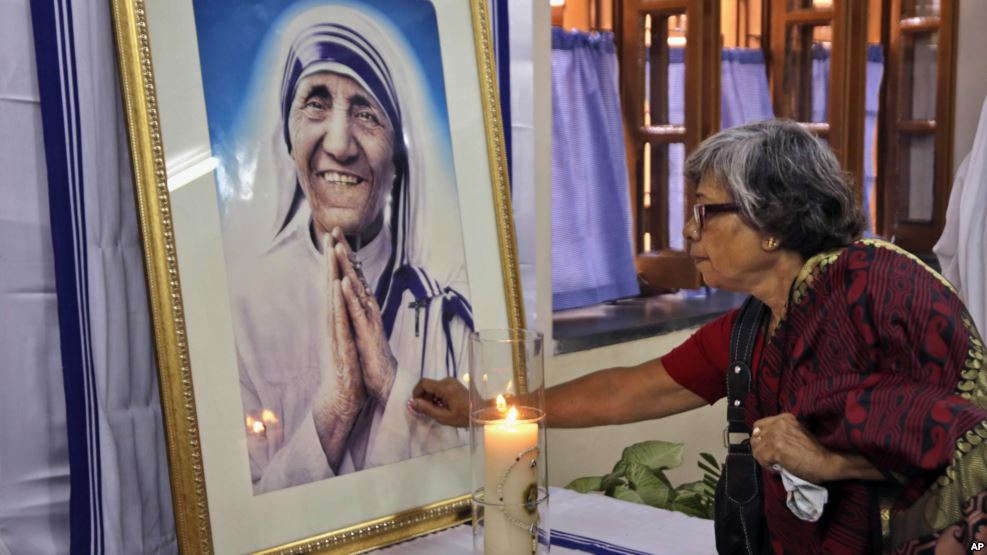
On Sunday, the Roman Catholic Church will officially recognize Mother Teresa of Calcutta (Kolkata) as a saint.
She will join a group of over 10,000 people recognized by the church as being holy because of the way they lived.
Even before the events of this weekend, Mother Teresa has become one of the most loved and well-known Catholics of modern times, according to Father John Trigilio. He serves as spiritual director at Mount St. Mary Seminary in Maryland.
For years, she worked with the poor and sick in Kolkata, India. It was previously known as Calcutta.
Mother Teresa started the Missionaries of Charity, which spread beyond Kolkata to other areas around the world.
“She was physically small,” Trigilio said. “She was an old lady, wrinkled, with no wealth, and yet her love for God and the poor and all her goodness enabled her to achieve so much.”
What people so like about her, he said, is that she showed, “You don’t need to be a wealthy person to achieve much goodness.”
On Sunday, Pope Francis will officially recognize Mother Teresa as a saint at a ceremony in the Vatican.
That recognition means church officials consider her a holy person. They believe she joined Jesus Christ in heaven immediately after her death in 1997. She was born 106 years ago in Skopje in what is now the Republic of Macedonia.
Karen Bussey is director of the Mother Teresa House in Lansing, Michigan. She is very happy that Pope Francis will recognize the former religious worker.
Mother Teresa died 19 years ago in the same week Bussey received approval to turn a Michigan home into a place for very sick patients. She wanted the house to provide care to the very ill in their final days of life.
“So we knew we should name the home for her (Mother Teresa),” Bussey said.
Bussey said this about her: “She is an endless inspiration for our work and service here. She would speak about great love is what really matters most. So our days are filled with doing the simple things to help make people more comfortable and feel loved.”
Mother Teresa once said there are two kinds of poverty: “the poverty of material, for example, in some places like India, Ethiopia or some other places, where people are hungry for bread, real hunger. But there is much deeper hunger and that is hunger for love.”
Mother Teresa felt that hunger, writing about her own doubts about faith and God’s love.
“Such deep longing for God — and … repulsed — empty — no faith — no love,” she wrote in 1956
Julia Upton is the Distinguished Professor of Theology at St. John’s University in New York. She said Mother Teresa’s continuous work to help the poor, despite her own spiritual questions, is something to “admire.”
Mother Teresa became well known, in part, because much of her work took place “during the time of mass media.” As a result, Upton said, images of her good work were broadcast across the world.
It has become popular for people to say when they want to let someone know they might not be quite as special as they think, “Well, you’re no Mother Teresa.”
Still, Mother Teresa has her critics. Some in India criticized her for trying to lead people from their own religion to Catholicism.
The journalist Christopher Hitchens wrote in Slate in 2003 that the hospice in Calcutta she operated “was as run down when she died as it always had been.” He also wrote that she accepted money from wealthy people with a questionable past.
Michael Witczak is a religion professor at Catholic University of America.
“The criticisms are there and they have been taken seriously, but they were not considered by the church to override the conviction that what she did was primarily for the good and…provided a good example for other people to follow,” he said.
I’m Bruce Alpert.
Mariama Diallo reported this story for VOANews.com. Bruce Alpert adapted her story and did additional reporting for Learning English. –George Grow was the editor.
We want to hear from you. Write to us in the Comments Section and share your views on our Facebook Page.
___________________________________________________________
Words in this Story
wrinkled – adj. having a small line or fold on your skin as you grow older
enable – v. to make someone or something able to do or to be something
achieve – v. to get or reach (something) by working hard
heaven – n. the place where God lives and where good people go after they die according to some religions
inspiration – n. something that makes someone want to do something or that gives someone an idea about what to do or create
comfortable – n. producing physical comfort
hospice – n. a place where people who are sick and near death are taken care of
conviction – n. a strong belief
doubt – n. a question or concern
